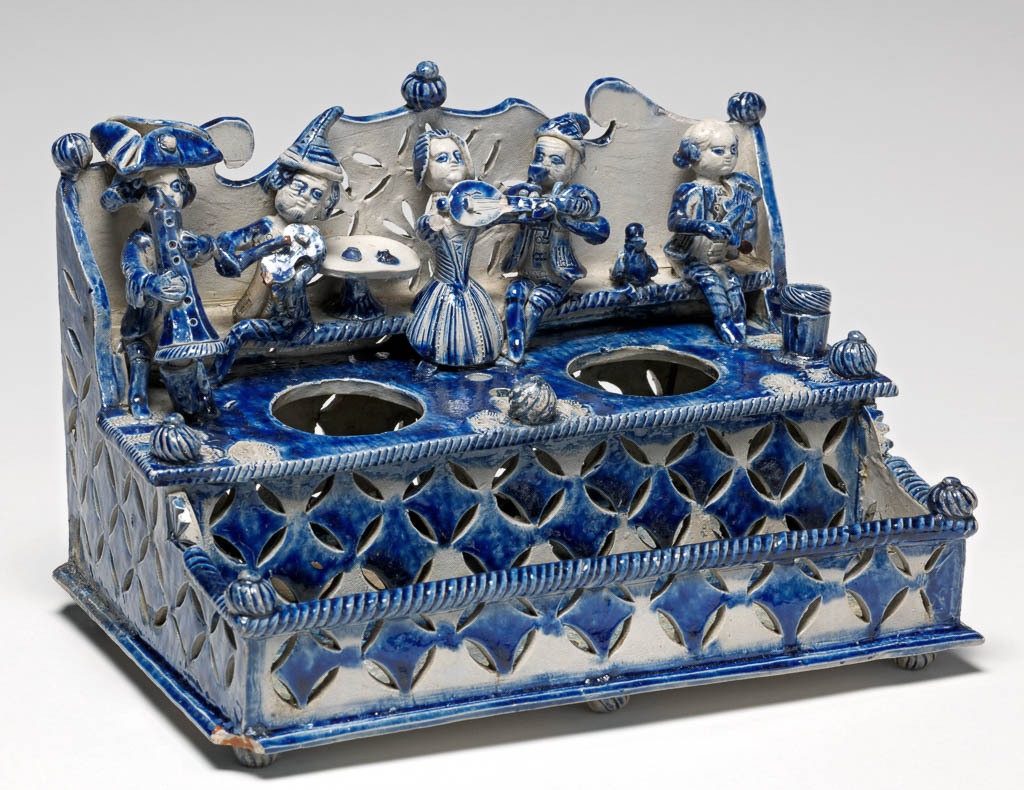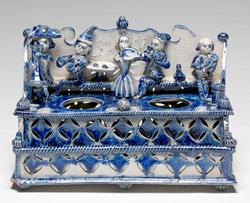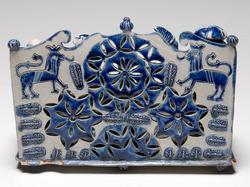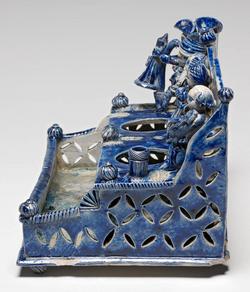Current Location: In storage
Maker(s)
Pottery:
Unidentified Westerwald pottery
Entities
Categories
Description
Rectangular salt-glazed stoneware inkstand decorated with pierced patterns and five modelled figures playing musical instruments and drinking.
Grey stoneware, with incised, pierced, and applied stamped decoration, painted in blue (smalt) and salt-glazed. In the form of a rectangular pedestal resting on six knob feet with two circular openings in the top for inkwells (missing), two small holes to take pens, and, on the right a small cylinder for a taper, a high back, in front of which is a bench with small figures of four men and a woman sitting on it playing musical instruments. A bottle and a dish stood (now missing) on a small table on the bench between two figures, and a pigeon perches between two others. In front, at the bottom, there is a projecting tray for the pens. The sides and front are decorated with circles pierced with elliptical holes which create lozenge shapes inside the circles, and there are knurled knobs on all the left and right corners, and in the middle of the top and back. The flat reverse is decorated with three and a half pierced rosettes, stamped leaf motifs, and on either side at the top, two crowned lions with incised outlines.
Notes
History note: George Stoner, Stoner & Evans, London, from whom purchased for £45 on 14 November 1919 by Dr J.W.L. Glaisher, FRS, Trinity College, Cambridge
Legal notes
Dr J.W.L. Glaisher Bequest
Measurements and weight
Depth: 14.2 cm
Height: 14.9 cm
Width: 20.3 cm
Acquisition and important dates
Method of acquisition: Bequeathed
(1928-12-07)
by
Glaisher, J. W. L., Dr
Dating
18th Century, Mid
Circa
1740
CE
-
1770
CE
Note
The figures on this inkstand are strongly reminiscent of English salt-glazed stoneware pew group figures of men playing musical instruments, and women sitting on high-backed settles, but it seems unlikely that there could have been a connection between them.
School or Style
Rococo
Components of the work
Decoration
composed of
smalt
( smalt was produced by fusing cobalt with an alkali, usually potash, and sand, to produce a glassy mass which was ground up to a powder and mixed with water)
Surface
composed of
salt glaze
Figures And Knobs
Materials used in production
grey
Stoneware
Techniques used in production
Salt-glazing
References and bibliographic entries
Related exhibitions
Identification numbers
Accession number: C.2058-1928
Primary reference Number: 76588
Old object number: 3830
Stable URI
Audit data
Created: Saturday 6 August 2011
Updated: Monday 29 April 2024
Last processed: Tuesday 15 July 2025
Associated departments & institutions
Owner or interested party:
The Fitzwilliam Museum
Associated department:
Applied Arts







